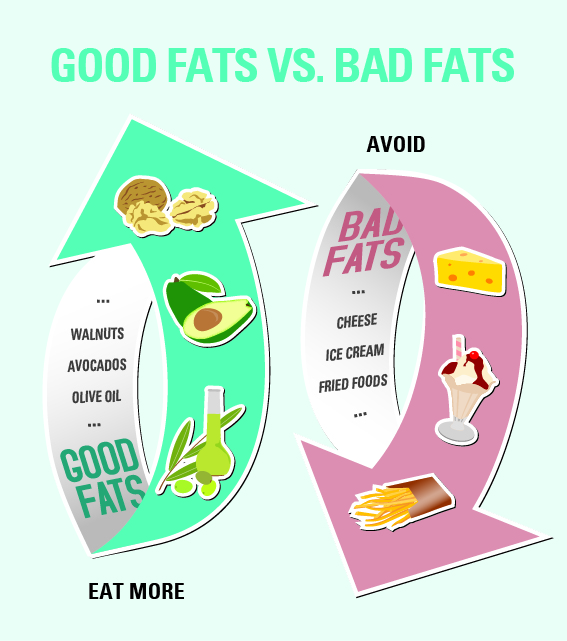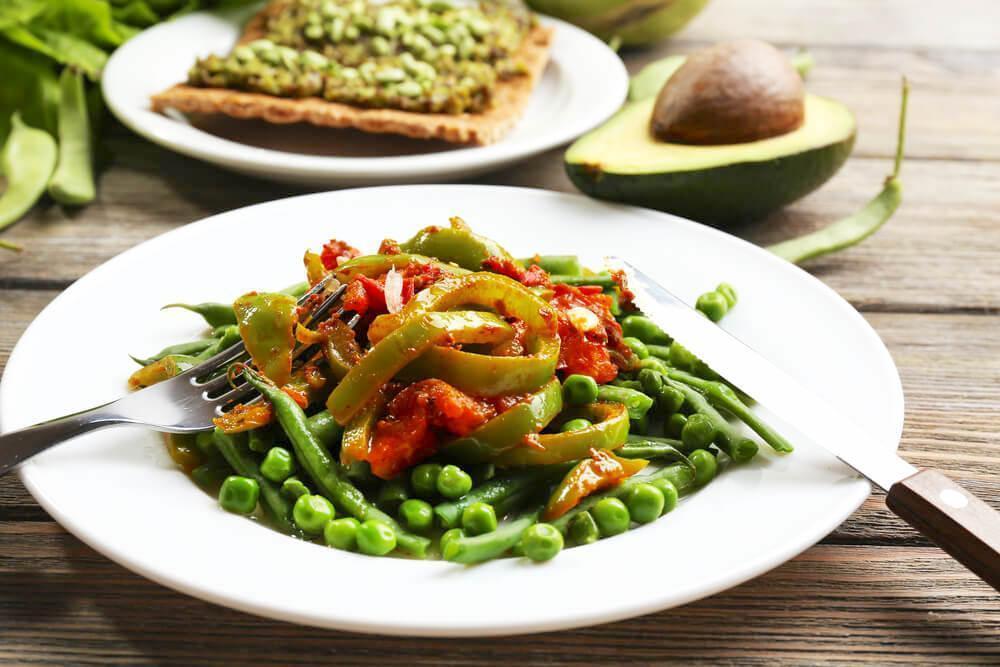Diet
12 Popular Diet Myths That Are Actually Harmful
With obesity being so prevalent in this day and age, diets are becoming increasingly popular, and there are now so many different diets being touted out there.
There is definitely nothing wrong with trying to improve your eating habits. In fact, this would benefit your health in numerous ways.
However, you need to make sure that the diet you are following is a healthy one. There are so many dangerous myths out there when it comes to dieting, so make sure that you are aware of all of the facts before making your decision.
MYTH: Cutting Back on Fats Will Help You to Lose Fat
Many people believe that following a low-fat diet is the best way to lose fat from the body, and while this may be true to an extent, this also means that you will end up missing out on all of the healthy fats out there.
Didn’t realize that some fats are healthy?
This is the problem with low-fat diets, are fats are actually important. Not only do they provide the body with energy, but they are also essential for helping the body to absorb fat-soluble vitamins, such as vitamins A, D, E and K.
While saturated fats, which come from foods such as fatty meats, butter, cream, and processed foods, are best avoided, unsaturated fats should form a part of your everyday diet.
Wondering where to get these healthy fats from?
Here are a few rich sources:
- Olives and olive oil
- Avocados
- Nuts
- Oily fish, such as mackerel and sardines

MYTH: Coconut Oil is the Healthiest Choice When it Comes to Oil
You have likely noticed how coconut oil has exploded in popularity over the last couple of years, and is often referred to as a wonder ingredient, not only for the body but also for the skin and hair. With food bloggers claiming that this oil can help with everything from weight loss to Alzheimer’s disease, it comes as no surprise that more and more people are giving coconut oil a try.
So, what exactly is the problem here?
Well, coconut oil is actually extremely high in saturated fats, which, as explained above, are a type of fat that you want to avoid.
Why?
Because saturated fats have been linked to everything from heart disease to raised blood cholesterol, all of which you should be trying to prevent.
While coconut oil does contain polyphenols, which are a beneficial plant compound, these can actually be found in larger amounts in other foods, such as fruits and vegetables.
There is nothing wrong with eating small amounts of coconut oil in moderation, but if you have started making this ingredient a significant part of your diet, then you are best off re-assessing this, as there are much healthier alternatives available.
MYTH: Juices Are a Healthy Meal Replacement
Just like with coconut oil, slow-pressed and green juices have been so popular lately.
There is no denying the many benefits that these juices can have, as they really do pack a punch when it comes to vitamins, minerals and antioxidants.
However, this does not mean that they should act as a meal replacement.
Why?
Well, firstly, research shows that the best way for your body to acquire all of those nutrients is through a balanced diet consisting of fruits, vegetables and grains. Although juices do contain many nutrients, the process of juicing removes all of the fiber from the fruits and vegetables, and fiber is what will help to keep you feeling full up until your next meal.

There is nothing wrong with having a juice or two a day as a snack in between meals, but make sure that you pay attention to the amount of sugar that has been added to the juice. Many pre-made versions contain high levels of sugar and sweeteners, which end up countering all of the good that the juice would have done for your body.
MYTH: Children Need to Drink Cow’s Milk Each Day
There are diet myths regarding children as well as adults, and, as you can imagine, this can be even more dangerous, as a child’s diet really does need to be balanced.
There are so many parents out there who insist that their children drink cow’s milk every day, believing that this is the best way for them to consume their daily recommended amount of calcium.
However, this is where they are wrong…
Research actually suggests that children who do not drink dairy milk are far less likely to develop ear infections, asthma and colic. In fact, the American Academy of Pediatrics firmly states that children under the age of one should never be given cow’s milk.
Wondering where to get your calcium from if you should not actually be drinking much milk?
Leafy green vegetables contain high amounts of calcium, as do beans, soy milk and other calcium-fortified foods. The only exception is with spinach, as the calcium found within spinach is not easily absorbed by the body.
MYTH: Carbohydrates Make You Fat
When trying to eat healthily, many people end up cutting carbohydrates out of their diet, especially since this is something that the famous Atkins’ Diet promoted.
However, carbohydrates are not all bad, and there are actually a number of good carbohydrates out there.
While sugar and refined foods are definitely best avoided, your body does need all of the nutrients and fiber that good carbohydrates bring.
Wondering where good carbohydrates come from?
Here are a few sources:
- Fruits and vegetables
- Beans
- Whole grains
When it comes to weight loss, research shows that following a low-carb diet, instead of a low-fat diet, may help with initial weight loss, but you are much more likely to end up regaining this weight rather than maintaining your new weight.
MYTH: Fasting is Necessary for Detoxification
Many people are under the impression that fasting their body will encourage it to detox, cleansing it of toxins and other unwanted substances.
However, there is actually no evidence out there to back this up…
The human body contains all that it needs to naturally detox on its own, without the need for fasting. Thanks to your liver, kidneys and spleen, your body is able to rid itself of toxins each day, and fasting has no impact on this at all.
When it comes to weight loss, fasting can actually make your life harder.
How?
Because fasting slows down your body’s metabolic rate, which means that the food you eat after your fast ends up being more fattening than it otherwise would have been.
MYTH: Fresh Vegetables are Better For You Than Frozen or Canned Versions
Yes, if you grow your own vegetables at home and are able to eat them soon after they have been picked, then there is not really much that can beat this.
However, for the majority of the population, frozen or canned vegetables are actually just as, if not more, beneficial than their fresh alternatives.
How?
Because many of these end up being frozen or canned soon after they have been harvested, which enables them to retain a large amount of their nutrients. In comparison, fresh vegetables that have been sat on a supermarket shelf for a week can end up losing quite a bit of their nutrients.
In fact, research shows that canned tomatoes are actually higher in lycopene, an important antioxidant, while canned corn also contains a higher level of antioxidant activity.
Keeping canned and frozen vegetables in the house is also a great way to ensure that you always have some vegetables around, and can often be a more affordable alternative to the fresh versions.
MYTH: Coffee Is Bad For You
Did you know that coffee actually brings the body quite a few different health benefits?
Here are some of the most interesting:
- Protection against type 2 diabetes
- Lowered risk of Parkinson’s disease
- Reduced risk of liver disease
- Lowered risk of heart disease
- Prevents premature death
- Reduced risk of multiple sclerosis
- Protection from colorectal cancer

Of course, the type of coffee you drink does have an impact on this…
Research shows that lighter roasts tend to have a higher antioxidant activity, because roasting causes the beans to be exposed to air, which leads to oxidation and a reduction in antioxidant molecules.
MYTH: Cutting Out Snacks is the Best Way to Lose Weight
Do you find yourself snacking a lot during the day?
There is actually nothing wrong with snacking. In fact, many people do need to snack in order to maintain their energy levels through the day.
The key here is taking a look at what snacks you are eating.
If you find yourself reaching for a packet of cookies or potato chips, then yes, cutting these out will definitely help you to lose weight.
However, this does not mean that you have to go hungry…
There are so many healthy snacks out there that you can opt for instead.
- Toast with peanut butter and banana
- Avocados on multi-grain crackers
- Vegetables sticks with hummus
- Greek yogurt with berries
- Spiced nuts
- Trail mix
- Marinated olives and artichoke hearts
MYTH: Gluten is Bad for Everybody
There are so many gluten-free foods out there, and more and more people seem to be believing that these are actually better for the body.
Is this true?
If you have celiac disease, which is something that affects about 5% of the population, then yes, gluten is something that you definitely want to be avoiding.
However, unless you have a medical reason for going gluten-free, this is not something that will necessarily benefit your health.
In fact, many gluten-free products are actually far more processed than whole-grain alternatives that do contain gluten, and you would be much better off going for the whole-grain versions instead. Gluten-free products also tend to be lacking in folate, which is an important nutrient that your body needs.
MYTH: A Vegan Diet Can Provide the Body With All of the Nutrients it Needs
There is no denying that a meat-free diet can have so many benefits, but the idea that a vegan diet provides the body with all that it needs is not true.

There is one important nutrient that a vegan diet is lacking in, and this is vitamin B12. This vitamin is most commonly found in animal foods, such as fish and eggs, and a lack of vitamin B12 can lead to mood disorders, memory loss and more.
While there are several foods out there that have been fortified with vitamin B12, you would need to eat so many servings of these a day in order to give your body what it needs.
This does not mean that you need to stop being a vegan…
Just be aware of the fact that you are not getting enough vitamin B12, and will likely need to turn to a vitamin B12 supplement to help with this.
MYTH: A Workout Can Burn Off All the Calories Consumed from an Unhealthy Meal
Are you guilty of sometimes indulging in a fast food meal, thinking that your workout later on in the day will help to counter the effects of this?
Unfortunately, you would have to exercise much more than you likely do in order to burn off the calories that you have consumed from an unhealthy meal.
For example, running for a mile on a treadmill would burn off about 100 calories, whereas eating six chicken nuggets would mean that you have consumed three times this amount. If you also had a soda and some fries, you would need to run for about eight miles in order to burn off that entire meal.
While exercise is definitely extremely important, this does not mean that you should be eating unhealthy foods alongside it. The best way to keep yourself healthy is a mixture of a good diet and regular exercise.
There are so many diet myths out there, and with social media backing many of them up, it can be difficult to know exactly what to believe. In order to keep yourself in-the-know, make sure that you thoroughly research any dietary fads you hear about before deciding to follow them.

